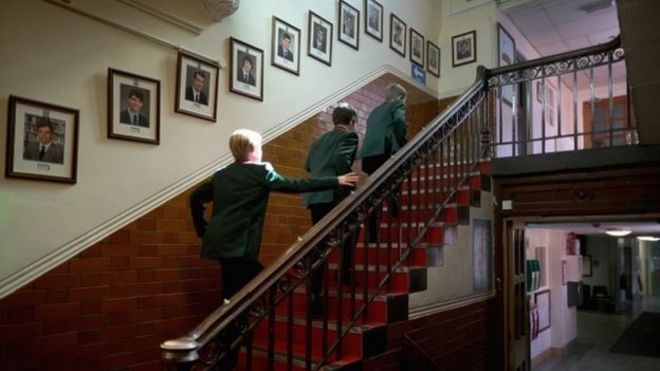
The majority of teachers and school leaders oppose Prime Minister Theresa May’s plans for a new wave of grammar schools in England, a survey suggests.
Eight out of 10 teachers and heads are against selection, the poll by the National Association of Head Teachers, the Association of School and College Leaders and charity Teach First finds.
A similar number did not believe a test at age 11 measured academic potential.
But Mrs May says schools should be able to select on the basis of ability.
Last week, she pledged to make Britain “the great meritocracy of the world” as she announced plans to lift a long-standing ban on new grammar schools.
‘Lower standards’
The survey was carried out for campaign organisation the Fair Education Alliance, which has launched a petition calling for the ban on new grammars to be kept in place. It gathered responses from 2,500 teachers, school leaders and heads.
It found:
- 82% of respondents oppose the opening of new grammars
- 80% do not believe that a test administered at age 11 can reliably measure long-term academic potential
- 79% believe that there is no evidence for increasing selection in education
- 81% believe that there is no evidence for opening grammar schools
- 85% do not believe a test at age 11 can be insulated from non-academic factors such as parental engagement or income.
Russell Hobby, general secretary of the NAHT, said: “Increasing the number of grammar schools will lower standards and restrict opportunity.
“We cannot afford such an elitist policy in the 21st Century – as many students as possible need a high-quality academic education. This is a terrible distraction from the issues that matter most.”
Malcolm Trobe, interim general secretary of ASCL, said: “We don’t need more selection in the education system.
“What schools desperately need is enough teachers and enough funding, both of which are in critically short supply.
“The government should focus on these issues rather than obsessing about an education policy plucked from the 1950s. Our job is to work together to ensure the education system supports all young people to achieve.”
A spokeswoman for the Department for Education said: “We know that grammar schools provide a good education for their disadvantaged pupils and we want more pupils from lower-income backgrounds to benefit from that.
“Our proposals will ensure that any new and existing selective schools will prioritise the admission of disadvantaged pupils and that they support other local pupils in non-selective schools to help drive up educational outcomes.
“As set out in the consultation document, we are clear that relaxing restrictions on selective education can and should be to the betterment, not at the expense, of other local schools.”
Brett Wigdortz, founder of the Fair Education Alliance, said: “We are united in our desire to improve social mobility, but it’s clear we must use proven policies to achieve this.
“We know great comprehensive schools and academies are delivering a stretching and ambitious education.
“We must aim to replicate this for every child, not selecting only a few to be supported to succeed, whilst leaving the majority behind.”
[Source:- BBC]








